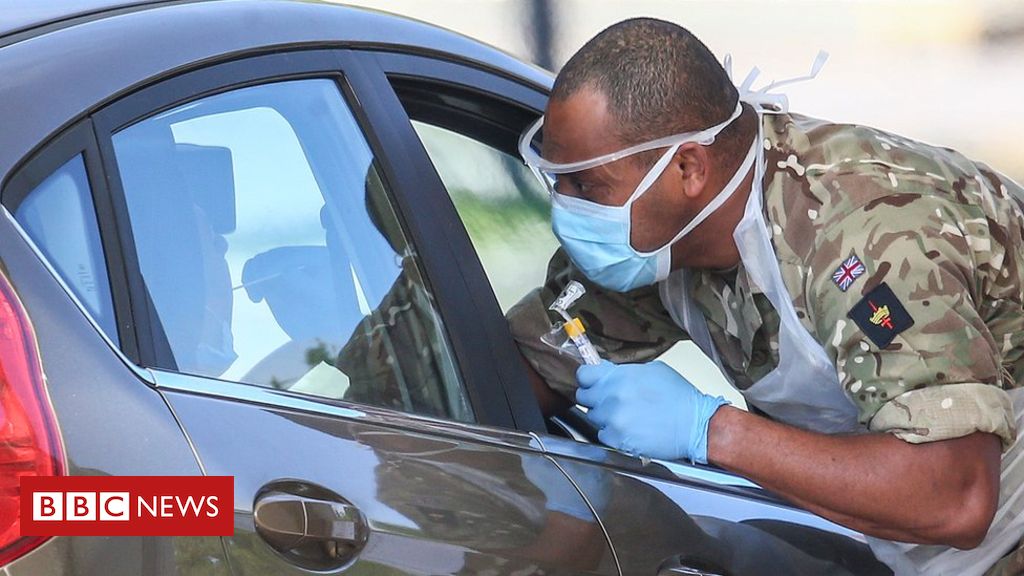
The military is to begin testing essential workers around the UK for coronavirus in mobile units which will operate in “hard to reach” areas.
The new pop-up facilities, which can be set up in 20 minutes, will travel to care homes, police and fire stations, prisons and benefits centres.
It comes as the government looks to reach its target of carrying out 100,000 tests per day by Thursday.
Meanwhile, the PM will return to work in Downing Street on Monday morning.
It is just over two weeks since Boris Johnson was released from hospital, where he was treated in intensive care for coronavirus.
On Saturday, the number of people confirmed to have died with Covid-19 in hospitals in the UK passed 20,000, with another 813 deaths announced.
Latest figures show that 28,760 coronavirus tests were conducted by 09:00 BST on 25 April – far short of the government’s target of 100,000 by the end of April.
Some health and care workers have previously reported having to make long journeys to their nearest drive-through testing centres.
Many care homes have said none of their staff have been tested, while others have spoke of struggles to access official test centres after reporting online they have symptoms.
Of 210 care providers contacted by the BBC earlier this week, 159 said none of their workers had been tested.
The new pop-up facilities will see swabs collected by “specially trained” military personnel and taken to one of three “mega labs” to be processed, with results expected within 48 hours.
Eight mobile units will test key workers on Sunday, in areas including Salisbury, Southport and Teesside.
The Department of Health and Social Care (DHSC) said the units would travel to areas where there was “significant demand”, and it plans to have 96 units up and running by the start of May.
The armed forces will staff 92 of the units, while civilian contractors will operate a further four located in Northern Ireland, the DHSC said.
Prof John Newton, who is co-ordinating coronavirus testing for the government, said these new mobile testing units would help achieve the goal of performing 100,000 tests a day by “providing tests to vital frontline workers wherever they need them”.
He said efforts to increase capacity had resulted in “scores of new testing facilities and Britain’s largest network of diagnostic labs in history”.
Since Friday, millions of key workers and people they live with have been able to book appointments online to be tested. Those too ill to travel should also be able to order home kits – although numbers are limited.
Since the website opened, slots for these tests have been booked up within hours and applications have had to close because of high demand.
The tests offered are swab tests that determine whether people currently have the virus – rather than whether they have had it in the past.
Applications to the UK government website was initially open only to people in England, but tests became available to people in Scotland on Saturday.
Boris Johnson is set to take charge of the government’s response to the outbreak when he returns to No 10 on Monday.
He has been recuperating from the virus at his country retreat, Chequers.
Mr Johnson prepared for his return with a three-hour summit meeting on Friday with Foreign Secretary Dominic Raab – who has been deputising for him – and Chancellor Rishi Sunak.
Labour leader Sir Keir Starmer has called on the PM to set out an “exit strategy” for lifting the lockdown.
In a letter to Mr Johnson, Sir Keir said the UK was in danger of falling behind other countries again – including the devolved administrations in Scotland and Wales – which were already engaged in “adult” conversations with their citizens as to how the restrictions could be eased.
“Simply acting as if this discussion is not happening is not credible, especially when other governments and our own devolved administrations have been able to communicate so much more,” he wrote.
At the daily No 10 briefing on Saturday, Home Secretary Priti Patel said the government was working towards returning the UK to normal, but said it was still too soon to begin easing up.
“We know that people are frustrated but we are not out of danger yet,” she said.
NHS England medical director Prof Stephen Powis said the virus would start to “spread more” if social distancing measures were lifted.
Meanwhile, the British Medical Association (BMA) has accused ministers of dragging their feet over calls for families of healthcare workers who lose their lives fighting coronavirus to be financially supported.
The doctors’ trade union said it had written twice to the chancellor raising the issue, but had yet to receive a response.
The government said it was currently considering the financial support for the families of those on the front line.
The BMA has also called for all key workers to be provided with face masks to combat the spread of the virus.
BMA chairman Dr Chaand Nagpaul told the Daily Telegraph that giving masks to “transport workers, shopkeepers, carers or supermarket staff” would offer “a level of protection, however small”.
He added: “The government must pursue all avenues of reducing the spread of infection. This includes asking the public to wear face coverings to cover mouths and noses when people leave home for essential reasons.”
How have you been affected by coronavirus? Share your experiences by emailing haveyoursay@bbc.co.uk.
Please include a contact number if you are willing to speak to a BBC journalist. You can also contact us in the following ways:
